Bangladesh’s interim leader held a second day of marathon talks Sunday with multiple parties seeking to build unity and calm intense political power struggles, party leaders and officials said.
Muhammad Yunus, the 84-year-old Nobel Peace Prize winner who is leading the caretaker government as its chief adviser until elections are held, has called for rival parties to give him their full support.
The South Asian nation of around 170 million people has been in political turmoil since former prime minister Sheikh Hasina was ousted by a student-led revolt in August 2024, ending her iron-fisted rule of 15 years.
Yunus met around 20 party leaders on Sunday, after talks that stretched late into Saturday evening with the major political parties, including those who have protested against the government this month.
Mamunul Haque, leader of the Islamist Khelafat-e-Majlish party, was among those who spoke to Yunus on Sunday in discussions that he said focused on “the ongoing crisis”.
– ‘Broader unity’ –
After a week of escalation during which rival parties protested on the streets of the capital Dhaka, the government led by Yunus warned on Saturday that political power struggles risked jeopardising gains that have been made.
“Broader unity is essential to maintain national stability, organise free and fair elections, justice, and reform, and permanently prevent the return of authoritarianism in the country,” it said in a statement.
Yunus on Saturday met with the key Bangladesh Nationalist Party (BNP), seen as the election front-runners, who are pushing hard for polls to be held by December.
According to Bangladeshi media and military sources, army chief General Waker-Uz-Zaman also said this week that elections should be held by December, aligning with BNP demands.
Microfinance pioneer Yunus, who returned from exile at the behest of protesters in August 2024, says he has a duty to implement democratic reforms before elections he has vowed will take place by June 2026 at the latest.
The caretaker government has formed multiple reform commissions providing a long list of recommendations — and is now seeking the backing of political parties.
Yunus has said polls could be held as early as December but that holding them later — with the deadline of June — would give the government more time for reform.
– ‘May further deteriorate’ –
But Mujahidul Islam Selim, a veteran leftist politician, said he told Yunus that the interim government was not required to complete all reforms.
“We urged them to leave fundamental reforms to the people”, Selim said Sunday.
“If they delay solving problems, the opposite may happen — the situation may further deteriorate.”
Yunus last held an all-party meeting — to discuss efforts to overhaul Bangladesh’s democratic system — on February 15. Some parties cited frustration at the lack of contact.
“We told him that if only he had engaged with political parties more frequently, nobody would mind delaying the election by a few weeks,” Saiful Haque, of the Biplobi Workers Party, told reporters after his meeting.
Sources in his office and a key political ally said on Thursday that Yunus had threatened to quit, but his cabinet said he would not step down early.
On Saturday, the government warned that it had faced “unreasonable demands, deliberately provocative and jurisdictionally overreaching statements”, which it said had been “continuously obstructing” its work.
Bangladesh’s tax authority workers ended a two-week partial strike on Sunday after they said the interim government would address their demands to stop an overhaul of the body.
Security forces had surrounded the national tax authority headquarters, after government orders to reform the National Board of Revenue (NBR) sparked fury from employees.
Yunus also met with leaders of Jamaat-e-Islami, the Muslim-majority nation’s largest Islamist party, and the National Citizen Party (NCP) made up of many students who spearheaded the uprising that ended Hasina’s rule.
NCP leader Nahid Islam warned on Saturday that rival parties were pushing for swift elections to skip reforms and “assume power”, and that he believed there were “indications” that a “military-backed government could re-emerge”.

